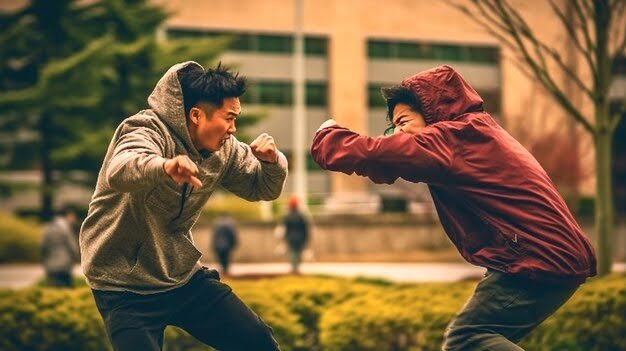
In moments of danger, knowing your rights can be the difference between staying safe and facing unnecessary legal consequences. The right to self-defence is an essential legal principle in Singapore, allowing individuals to protect themselves or others when faced with a threat. However, this right comes with conditions to ensure it is not abused.
In this guide, we’ll explore what the right of self-defence entails, the boundaries set by Singapore law, and how you can protect yourself while staying on the right side of the law.
What Is The Right To Self-Defence?
In Singapore, the right to self-defence is a legal provision outlined in the Penal Code, specifically under Sections 96 to 106, which allows individuals to protect themselves, others, or property from harm caused by unlawful acts. This right ensures that individuals can defend themselves when facing an immediate threat, provided their actions remain within legal boundaries.
When Is It Legal To Exercise Your Right To Self-Defence?
Under Singapore law, the right of self-defence is governed by strict conditions to ensure it is exercised appropriately and responsibly. You are permitted to act in self-defence only when specific criteria are met, ensuring your actions are lawful and justified.

Imminent Threat Of Harm
The threat must be immediate and unlawful. Without real and present threats, you cannot claim self-defence for hypothetical, future dangers or situations. For instance, if someone is about to attack you or another person physically, you are entitled to act to prevent the harm. However, acting pre-emptively without a clear and imminent danger may not qualify as lawful self-defence.
Proportionate Use Of Force
The force you use to defend yourself must match the severity of the threat. For example, if someone attempts to punch you, responding with deadly force, such as using a weapon, may be considered excessive and could lead to criminal charges. The law ensures that self-defence is used strictly to neutralise the danger, not to escalate or retaliate.
Necessity Of Action
Self-defence must be a necessary response to the situation. If you can safely avoid the confrontation, such as fleeing or de-escalating the conflict, you are expected to take that option instead of using force. Actions taken beyond what is necessary to prevent harm may no longer fall under the protection of self-defence laws.
Examples Of Lawful Self-Defence
- Preventing An Assault: If someone lunges at you with a weapon or raises a hand to strike you, you may block the attack or use reasonable force to protect yourself.
- Defending Another Person: If you witness an individual being assaulted or threatened, you can intervene and protect them, provided your actions are proportionate and necessary to stop the threat.
- Protecting Property: When someone attempts to steal your belongings or trespass on your property, you may take reasonable steps to stop them. However, excessive force, such as inflicting unnecessary harm after recovering your property, would not be justified.
What Is Not Considered Self-Defence?
While self-defence is a lawful right, clear boundaries under Singapore law determine when this defence cannot be claimed. Specific actions or situations fall outside the scope of self-defence, and understanding these exceptions is critical to avoid legal consequences.
1. Retaliation Or Revenge
Self-defence is intended to neutralise a threat, not inflict harm beyond necessary. Once the aggressor has been subdued, disarmed, or the danger has ceased, continuing to harm them is no longer considered self-defence. Such actions are viewed as retaliation or revenge, which are not protected by the law.
For example, if an individual attacks you and you successfully fend them off, any further act of violence—such as striking them repeatedly while they are incapacitated—would not fall under self-defence. Instead, this would likely result in criminal liability for assault or causing grievous hurt.
2. Provoked Confrontations
If you provoke a conflict or instigate an altercation, you cannot later claim self-defence if the situation escalates. The law does not protect individuals who initiate violence or create circumstances where the other party is forced to respond defensively.
For instance, if you intentionally provoke someone with aggressive language or behaviour and they retaliate, any force you use to counter their actions may not qualify as self-defence. The Courts will assess whether your actions contributed to the confrontation and may rule against your claim.

3. Use Of Excessive Force
Self-defence must be proportionate to the threat faced. Using more force than necessary to prevent harm can lead to criminal charges, as it goes beyond what is deemed reasonable. The principle of proportionality ensures that self-defence is not used to justify unnecessary violence.
For example, if someone attempts to push you during a dispute, responding by severely injuring them with a weapon would likely be classified as excessive force. The law expects individuals to use only the minimum force required to neutralise the threat.
Self-Defence Against Different Types Of Threats
The right to self-defence in Singapore applies to various situations where an individual, their property, or another person is threatened. However, the legal response varies depending on the type of threat encountered. Understanding these distinctions ensures that actions taken are both lawful and appropriate to the situation.
1. Physical Threats: Defending Yourself Against Assault Or Battery
When faced with a physical attack, the law permits using reasonable force to protect yourself. For instance, if someone attempts to strike or injure you, you may respond by blocking the attack, pushing the aggressor away, or using proportionate measures to neutralise the immediate threat.
However, the force used must not exceed necessary to prevent harm. For example, responding to a slap with a violent counterattack involving a weapon may be considered excessive and lead to criminal liability.
The Courts will evaluate factors such as:
- The severity of the attack.
- Whether the response was necessary and proportionate.
- Whether alternative options, such as retreating or calling for help, were available.
2. Threats To Property: Protecting Your Belongings Within Legal Limits
The right to self-defence protects property from theft, damage, or unlawful possession. Under Singapore law, individuals can take reasonable action to defend their possessions from being unlawfully taken or destroyed.
For example, if someone attempts to steal your bag, you may pull it away or physically stop them from fleeing. However, injuring the thief after recovering your belongings, such as by punching or kicking them, is likely excessive and outside the scope of self-defence.
The law prioritises proportionality and necessity in such situations, ensuring that individuals safeguard their property without causing unnecessary harm.
3. Threats To Others: Acting To Protect Another Person
Singapore law allows individuals to intervene and use reasonable force to protect others from harm. This is particularly relevant in cases where you witness someone being assaulted or threatened.
For example, if a bystander is being attacked, you may step in to shield them or restrain the aggressor. However, the same principles of proportionality and necessity apply. Actions taken must address the immediate threat and not escalate the situation further.
While defending others is legally permitted, it is essential to carefully assess the situation before intervening. These alternatives are generally preferred if the threat can be neutralised without physical confrontation—for instance, by alerting the authorities or creating a distraction.
Conclusion About Right To Self Defence
The right to self-defence is a crucial legal safeguard in Singapore, but it comes with responsibilities. By understanding the boundaries of this right, you can protect yourself effectively without risking legal repercussions.
If you face charges despite acting in self-defence, consult experienced legal professionals, such as Tembusu Law, which is known for having some of the best criminal lawyers in Singapore.
They can provide free legal consultation and representation to help you navigate the complexities of the legal system.
Frequently Asked Questions About Right To Self Defence
What Happens If I Use Excessive Force In Self-Defence?
Using excessive force may result in criminal charges, such as assault or voluntarily causing hurt. The Court will assess whether the force used was proportionate to the threat.
Can I Defend Someone Else Under Self-Defence Laws?
Yes, you can use the right of self-defence to protect another person if they are facing an imminent and unlawful threat.
What Should I Do After Acting In Self-Defence?
Report the incident to the authorities immediately, provide an honest account, and present any evidence that supports your claim of self-defence.
Can Self-Defence Be Used As A Legal Defence In Court?
Yes, self-defence can be a legal defence if you act lawfully. The Court will evaluate the situation to determine if your actions were justified.